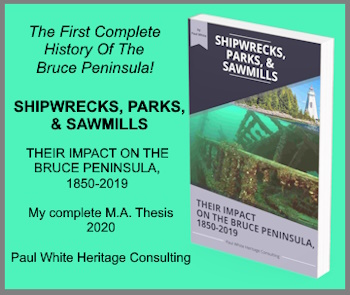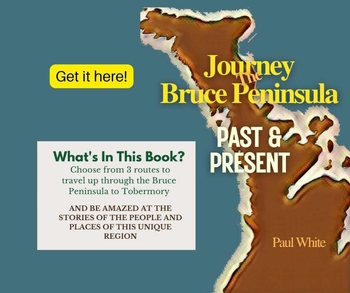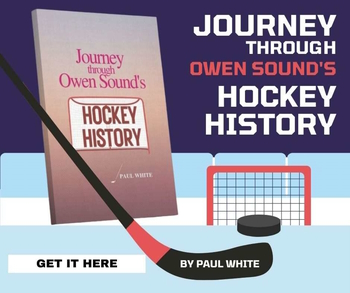Masters Mates and Pilots Association: Owen Sound had First Canadian Chapter
The Masters, Mates and Pilots Association, an American seafaring organization created its first Canadian chapter in Owen Sound. This was a welcome event in many quarters of Georgian Bay.
Maritime safety was always a concern for the many of the Georgian Bay region residents who depended upon Great Lakes shipping as a means of personal travel or the transportation of goods, either incoming or outgoing.
1882 - Canadian Government Regulates Passenger Numbers on Ships
There had been some action taken to make Great Lakes shipping safer. For instance, in 1882 the Canadian government passed an Order-in-Council regulating the number of passengers that each lake vessel could carry. This action was due in part to several serious maritime accidents in the 1870s and 1880s which had cost many lives.
Maritime travel was often the best means of travel for cargo and passengers as roads and railway connections at this time were often less than efficient. Passengers often complained of overcrowding and overloading. Therefore, the limitations placed on vessels by the Order-in-Council were probably welcomed by seagoing travellers.
Three ships sailing on a regular basis out of Owen Sound, the Frances Smith, Campana, and the City of Owen Sound, were impacted by this action as they had their allowable passenger capacities reduced to 370, 600 and 400 respectively,
If these are numbers that were deemed acceptable one has to wonder how many passengers were previously being loaded on to these ships.
While efforts were made to protect passengers and cargo, little was done to improve the conditions of the men and women who worked on the Great Lakes ships. Education and training, poor working conditions and low pay were not considered to be factors worth investigating. Many veteran sailors argued that improved training, better pay and better working conditions would in turn make the shipping industry less dangerous and therefore reduce the number of maritime accidents in the already treacherous Great Lakes.
Many attempts were made to organize the workers who depended upon maritime shipping as a livelihood. It was hoped that the organization of sailors would lead to better training, better pay and better working conditions and therefore fewer shipping disasters. Unfortunately, for any number of reasons these efforts were generally unsuccessful.
1920 - Masters, Mates, and Pilots Association comes to Canada
However, in 1920 Owen Sound sailors took steps to try and improve their situation. A meeting was held in January of that year in the council chambers at City Hall. Present at the meeting was Captain. Strain, of Buffalo, N.Y., the first national vice-president of an American group, the Masters, Mates and Pilots Association, and Captain John Wharry.
This group had been active for several years in the United States and had successfully improved the conditions of American sailors on the Great Lakes. They had come to Owen Sound to attempt to create the first local of their Association on Georgian Bay, Strain illustrated that because of their accomplishments American ships were generally safer than Canadian ones. One example given was the fact that by law Canadian ships could sail without a full crew whereas American ships could not leave port one man short.
The Masters, Mates and Pilots Association also carried out extensive training programs and encouraged all sailors to improve their capabilities. In financial matters it was pointed out that Canadian and American ships charged the same rates for carrying freight, however American crews were higher paid and Canadian ships did not always carry a full crew. Therefore, Canadian owners made larger profits, but at the same time their ships were not always as safe.
The representatives of the Association claimed that they were not in Owen Sound to seek conflict with Canadian owners, but instead were interested improving the conditions of their Canadian counterparts and to promote safer conditions on the Great Lakes.
After much discussion a chapter of the Masters, Mates and Pilots Association was formed. It was decided that sailors from other Georgian Bay ports would be approached about forming their own groups. However, more importantly, training sessions were organized and held in the Owen Sound Library on a weekly basis. These sessions were to be conducted by Captain Norman McKay and Captain Wharry. All members and potential members, even those already certified as mates and captains, were encouraged to take part in these programs.
The Masters, Mates and Pilots Association was the first of many organizations to attempt to improve the working conditions of the men and women who sailed the Great Lakes and it is indeed interesting that Owen Sounders were chosen to pioneer this cause of maritime safety.
Georgian Bay Shipping
List of Lighthouses on the Great Lakes: If you have names and/or pictures of Great Lakes Lighthouses please submit them along with details of their location.
Georgian Bay Ships: A List of all the ships that sailed on Georgian Bay until the 1960s. This list is not complete. If you know of a ship that sailed the waters of Georgian Bay please contact me with information about that vessel, and, if you have a picture that I could post with it, that would be much appreciated.
1885: A Memorable Summer Job for Owen Sound teenage boys on the Great Lakes would have historic importance, not mention a possible exciting career opportunity.
Hindman Transportation Company was a well-known Great Lakes shipping company for many years. Here you will find pictures of many of the Hindman ships
Owen Sound Harbour – A Photographic History, by Robert A. Cotton is a book that interests my historiographical curiosity.
Commercial Great Lakes Fishing It is probably safe to suggest that the commercial fishing industry was an important part of the early growth of this region.
A Georgian Bay fishing vacation has long been a popular attraction in the Bruce Peninsula region. During fishing derbies, the regional waterways are dotted with fishing boats of all shapes and sizes.
The Georgian Bay Mackinaw, designed by William Watts of Collingwood is an example of a Georgian Bay innovator creating a vessel to service the needs local mariners.
Great Lakes fishing is an asset that is protected and developed, not only for its economic potential but also for those who just enjoy spending a day by the side of a river or in small fishing boats trying to catch “the big one”!
Great Lakes Fishing History is not without its controversy. The impact of the fishing industry was such that it played an important role in the development of communities along the Georgian Bay and Lake Huron shoreline.
Georgian Bay Travel Before the Winter Freeze-Up could be a dangerous time for mariners in the early years in this region.
A Harbinger of Spring on the Great Lakes in pioneer times, was the eagerly awaited news that a lighthouse had been lit and shipping traffic could begin sailing from port to port.
Lumber Hookers Lumber hookers and tugs were an important innovation to improve the transportation of lumber on Georgian Bay.
Mapmakers on Georgian Bay were also explorers. They mapped the Georgina Bay shoreline noting safe harbours, dangerous reefs and other guides for sailors and pioneer settlers looking for a place to call home.
Paddling Georgian Bay & Pondering: traversing parts of this great waterway in a canoe leads one to wonder about the ships of a bygone era battling the rough seas they encountered.
Parry Sound Shipping History: The Parry Sound area has always been connected to the southern regions of the Province of Ontario by a system of good roads. Or has it?
Parry Sound’s shipping history 2 is more than the tragic sinking of the Waubuno or the later catastrophe surrounding the sinking of the Asia.
Sailing Season Closing: A Frantic Time on Peninsula as ships raced from port to port delivering and picking up passengers and produce before the waterways froze.
Ship Captain Andrew Port was not only a dynamic and brave Georgian Bay mariner, he was a personal favourite historical character of mine.
Ships Stuck in Ice: The Oak Glen was icebound in 1996 but this sailing hazard has been impacting vessels on Georgian Bay since the beginning of time.
Lake Huron shipwrecks, the Hibou often occurred in the Georgian Bay region of that Great Lake due to the often violent waters that could strike unsuspecting vessels like the Hibou.
Shipwrecks: The "Asia" wrecked off the eastern coast of Georgian Bay taking all but two of the more than 100 passengers to a watery grave.
Masters, Mates, and Pilots Association created its first Canadian chapter on Georgian Bay, providing maritime safety education, and other seafaring issues to better inform its membership.
Pioneer Travel Aboard the Fly Tells the story of a sailing vessel as the tenuous link between survival and death in a pioneer settlement in the 1840's in Upper Canada.
Sailing Stories: the Captain Who Smelled his way into Port The Captain Who Smelled his Way into Port details how pioneer seamen on Georgian Bay safely sailed the rough waters without the aid of the modern technological tools so readily used by today's mariners.
Sailing Story: The Voyage of the Prince Alfred the incredible voyage of the Prince Alfred, fraught with danger for both vessel and the crew in the winter of 1880.
Shipbuilding As the southern Georgian Bay region became more populated shipping traffic increased to meet the needs of an expanding market place.
The Summer of 1844 was No Picnic for the early settlers in the pioneer area near what would become Owen Sound on Georgian Bay.
The CPR Grain Elevator Fire of 1911 spelled the end of Owen Sound's role as the eastern terminus of the CPR Great Lakes Fleet.
Georgian Bay shipping occurred long before the first Europeans paddled these waters. But the fur and timber trades opened Georgian Bay to shipping in a big way!





